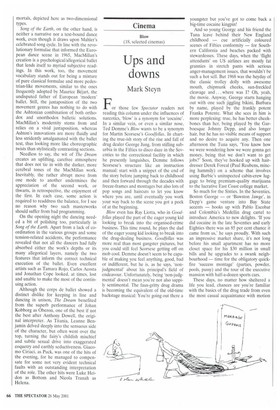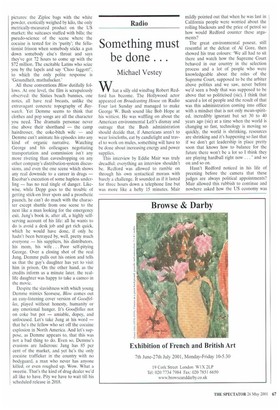Cinema
Blow (18, selected cinemas)
Ups and downs
Mark Steyn
For those few Spectator readers not reading this column under the influences of narcotics, 'blow' is a synonym for 'cocaine'. In a similar vein, or even a similar nose, Ted Demme's Blow wants to be a synonym for Martin Scorsese's Goodfellas. In charting the true-ish story of the rise and fall of drug dealer George Jung, from stifling suburbia in the Fifties to disco daze in the Seventies to the correctional facility in which he presently languishes, Demme follows Scorsese's structure like an instruction manual: start with a snippet of the end of the story before jumping back to childhood and then forward through the decades with freeze-frames and montages but also lots of pop songs and haircuts to let you know where you are, until eventually you work your way back to the scene you got a peek of at the beginning.
Blow even has Ray Liotta, who in Goodfellas played the part of the eager young kid looking to break into the organised-crime business. This time round, he plays the dad of the eager young kid looking to break into the drug-dealing business. Goodfellas was more real than most gangster pictures, but you could still feel Scorsese getting off on mob cool. Demme doesn't seem to be capable of making you feel anything, good, bad or indifferent, but he is, as he says, 'nonjudgmental' about his principal's field of endeavour. Unfortunately, being non-judgmental' doesn't mean you're not also sappily sentimental. The faux-gritty drug drama is becoming the equivalent of the old-time backstage musical: You're going out there a
youngster but you've got to come back a big-time cocaine kingpin!
And so young George and his friend the Tuna leave behind their New England childhood — cue artificially coloured scenes of Fifties conformity — for Southern California and beaches packed with stewardesses. These days, when the 'flight attendants' on US airlines are mostly fat grannies in stretch pants with serious anger-management issues, that wouldn't be such a hot sell. But 1968 was the heyday of the classic trolley dolly with awesome mouth, chipmunk cheeks, sun-freckled cleavage and ... where was I? Oh, yeah, the movie. Anyway, George starts hanging out with one such jiggling bikini, Barbara by name, played by the frankly potent Franka Potente. What she sees in him is more perplexing: true, he has better cheekbones than her, being played by the Garboesque Johnny Depp, and also longer hair, but he has no visible means of support and no desire to acquire any. Then one afternoon the Tuna says. 'You know how we were wondering how we were gonna get money, being that we don't want to get jobs?' Soon, they've hooked up with hairdresser Derek Foreal (Paul Reubens, mincing hammily) on a scheme that involves using Barbie's uninspected cabin-crew luggage to bring premium-quality marijuana to the lucrative East Coast college market.
So much for the Sixties. In the Seventies, Boston George — or `Bawston Jawge', in Depp's game venture into Bay State accents — hooks up with Pablo Escobar and Colombia's Medellin drug cartel to introduce America to new delights. 'If you did cocaine in the late Seventies and early Eighties there was an 85 per cent chance it came from us,' he says proudly. With such an impressive market share, it's not long before his small apartment has no more closet space for his $30 million in small bills and he upgrades to a swank neighbourhood — time for the obligatory quickfire 'success montage' (parties, powder, pools, pussy) and the tour of the executive mansion with half-a-dozen sports cars.
These days, no matter how sheltered a life you lead, chances are you're familiar with the basics of the drug trade from even the most casual acquaintance with motion pictures: the Ziploc bags with the white powder, exotically weighed by kilo, the only metrically-measured product on the US market; the suitcases stuffed with bills; the pseudo-science of the scene where the cocaine is tested for its `purity'; the fellationist frisson when somebody sticks a gun down somebody else's throat and says they've got 72 hours to come up with the $72 million. The excitable Latins who seize you by the lapels and say 'Cho° faggott!', to which the only polite response is 'Gesundheit, muthafucker.'
All these conventions Blow dutifully follows. At one level, the film is scrupulously observed: the Sixties beach bunnies, one notes, all have real breasts, unlike the extravagant concrete topography of Baywatch. Yet Demme seems to think that clothes and pop songs are all the character you need. The dramatis personae never rise above their shorthand — the camp hairdresser, the coke-bitch wife — and Demme can't animate his episodes into any kind of organic narrative. Watching George and his colleagues negotiating transportation and commission isn't any more riveting than eavesdropping on any other company's distribution-system discussions, and even the one scene which shows any real downside to a career in drugs — Escobar's execution of some hapless underling — has no real tingle of danger. Likewise. while Depp goes to the trouble of getting stick-on liver spots and a prosthetic paunch, he can't do much with the character except shuttle from one scene to the next like a man looking for the emergency exit. Jung's book is, after all, a highly selfserving account of his life: all he wants to do is avoid a desk job and get rich quick, which he would have done, if only he hadn't been betrayed by, well, pretty much everyone — his suppliers, his distributors, his mom, his wife .. . Poor self-pitying George. Over a closing shot of the real Jung. Demme pulls out his onion and tells us that the guy's daughter has yet to visit him in prison. On the other hand, as the credits inform us a minute later, the reallife daughter was happy to take a cameo in the movie.
Despite the slavishness with which young Demme mimics Scorsese, Blow comes out an easy-listening cover version of Goodfellas, played without honesty, humanity or any emotional hunger. It's Goodfellas not on coke but pot — amiable, dopey, and unfocused. Let's take Jung at his word — that he's the fellow who set off the cocaine explosion in North America. And let's suppose, as Demme appears to, that this was not a bad thing to do. Even so, Demme's evasions are ludicrous: Jung has 85 per cent of the market, and yet he's the only cocaine trafficker in the country with no bodyguard, a man who never has anyone killed, or even roughed up. Wow. What a sweetie. That's the kind of drug dealer we'd all like to have. Pity we have to wait till his scheduled release in 2018.



















































































 Previous page
Previous page